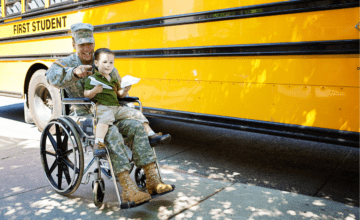Amy Hunter and Neal Horen, Georgetown University Center for Child and Human Development

Abstract
Infant and early childhood mental health (IECMH) consultation has gained increasing attention over the years as an effective approach to supporting young children’s social–emotional development (Brennan et al., 2008; Hepburn et al., 2013). The current syndemic (the aggregation of two or more concurrent epidemics that interact synergistically to exacerbate the burden of disease; e.g., COVID-19 and racism) highlights the increasing and disparate mental health needs of young children and their families. The syndemic offers an opportunity to shine a light on IECMH consultation as an effective and efficient approach to supporting the mental health needs of young children and their families. This article explores how IECMH consultants shift how they do their work in the midst of the syndemic and describes the benefits of IECMH consultation as a powerful and necessary intervention during this unprecedented time.
“I feel like I can’t breathe,” Jewel, a family child care provider, shared with her infant and early childhood mental health (IECMH) consultant. Jewel went on to mention the stress she was feeling providing care for a few young children in her home, far fewer children than before the pandemic. She described that she was worried about her finances because she didn’t know if her family could survive on the little income she was receiving from the reduced number of children in her care. She shared worries about the health of the children and families and about staying healthy herself. She described particular concerns about not knowing if one of the children or someone in her own family might be an asymptomatic spreader of the coronavirus. She went on to talk about how virtual schooling made it difficult to divide her attention between supporting her own children with their schoolwork and online meetings and providing the needed care for the toddlers and preschoolers in her family child care home. She explained that her reduced income had forced her to lay off a co-caregiver who had previously worked with her. Working alone was particularly hard lately because the children seemed to be acting up and getting on each other’s nerves. Jewel shared that her daughter had been attending protests in the city to express support for Black Lives Matter in the wake of George Floyd’s death. Jewel explained that while she strongly supported peaceful protest and making their voices heard, she worried about her daughter’s health and physical safety. Jewel was almost in tears talking about the pressures and the uncertainty of knowing how or when the situation might get better. As Rhonda, an IECMH consultant, listened to all that Jewel was holding, she took a deep breath and reflected on Jewel’s description of stress as feeling like not being able to breathe. The two women sat for a moment with the weight of the current crises impacting the country.
Michelle, a teacher in New York City, noticed a picture of children on a resource about “returning to school.” The resource offered guidance to teachers and school systems about supporting children upon the eventual return to in-person school after the quarantine, yet, the children in the picture were not wearing masks. Michelle was unnerved. She had two family members pass away as a result of the coronavirus. She expressed her outrage to the IECMH consultant, Joe, who provided support to the preschool. Joe understood that underneath Michelle’s outrage was her grief for the loss of her family members. Joe asked Michelle about her losses. As Michelle was talking, she also shared how very scared and worried she was about going back into the classroom.
Anna has been a home visitor for 20 years. She has supported families through nearly every kind of crisis, yet never a pandemic. The coronavirus pandemic has required that she provide her home visits to young children and their families virtually, which has been very challenging. Not all Anna’s families have Internet access, so many of the visits are phone calls to her families. In the transition from in-person visits to virtual visits, Anna has had time to attend some trainings. In the trainings she has been reminded that substance use, domestic violence, and child abuse and neglect may be on the rise during this time. Anna is worried about a number of her families. She is aware that some of the parents she works with are in recovery. She is concerned that the isolation of the quarantine and the added stress of job loss, the pandemic, and the tensions of the needed attention to racial injustice may contribute to reoccurrence of substance use problems. Anna isn’t sure how to ask the families about these sensitive topics, particularly over the phone or on video calls. Jessie, the IECMH consultant, and Anna explore together how she might be able to sensitively ask her families how they are coping.
These vignettes highlight a few of the many ways the professionals who care for and work with young children and their families are under increased stress during these unprecedented times. The vignettes illustrate some of the types of concerns IECMH consultants may experience during what we will refer to as a syndemic. A recent Lancet article (Horton, 2020) described a syndemic as characterized by “biological and social interactions between conditions and states, interactions that increase a person’s susceptibility to harm or worsen their health outcomes” (p. 874). COVID-19 and other noncommunicable diseases (e.g., diabetes, asthma, cancer, heart disease, obesity) exist in a context of social and economic disparity that exacerbates the adverse effect of each of the diseases. Recognizing COVID-19 as a syndemic acknowledges the impact of patterns of inequality and systemic racism in our society. This article will describe the impact of the syndemic on young children’s mental health and the unique role mental health consultants can have in assisting to mitigate its social–emotional consequences.
The Impact of the Syndemic on Children’s Mental Health
COVID-19 has had a profound impact globally, nationally, and locally. It impacts everyone’s lives. At the same time, much of the US is paying needed attention to racial injustice and systemic racism that influences every aspect of life, including disparities and outcomes related to COVID-19. This syndemic has a direct impact on society’s health and well-being.
Yet, the stresses of these circumstances have unique potential negative impacts on the mental health of children and their families in a variety of ways. Children’s mental health deteriorates when the economy worsens, and the use of special education for emotional problems also rises when economic conditions deteriorate (Golberstein et al., 2019). Children’s mental health is negatively impacted by racism. Children who reported discrimination are at higher risk for anxiety, depression, and other mental health and behavioral problems (Marcelo & Yates, 2019). Other potentially impactful threats to children’s mental health related to the syndemic include: anxiety and worry regarding contracting coronavirus or someone in their family becoming ill, social isolation from needed peer interaction, grief and loss of loved ones passing, decreased opportunities for stress regulation (e.g., play; sports; exposure to alternative caregivers, mentors, and teachers), increased exposure to parental mental illness, domestic violence, parental substance use, poverty, and child maltreatment and neglect (Fegert et al., 2020). In addition, this may be a particularly challenging time for children already experiencing stress or vulnerability including children with disabilities, children who have previously been exposed to trauma, children with pre-existing mental health or health problems, children in families who have recently immigrated to the US, and children living in families who are living below the poverty line.
Young Children May Be Particularly Vulnerable
Young children may be at particular risk for mental health concerns (National Scientific Council on the Developing Child, 2008/2012) as a result of the syndemic for a variety of reasons (Fegert et al., 2020). Young children’s mental health is strongly influenced by their environment and the relationships surrounding them. Young children’s brains are still developing, and they process emotional responses and traumatic events differently than older children or adults. Mental health or behavioral concerns in young children are often more difficult to identify and diagnose due to the significant variation in typical child development. Trauma or significant adversity early in life can impair the developing brain and increase the likelihood of significant mental health and health problems later in life (National Scientific Council on the Developing Child, 2008/2012).
Finally, young children thrive on the care of nurturing and responsive adults and safe and predictable environments. Very young children look to their caregivers to make sense of the world around them and help buffer the impact of stress. Yet, our current circumstance is not predictable. Safety is at risk, racism persists, and many caregivers are extremely stressed.
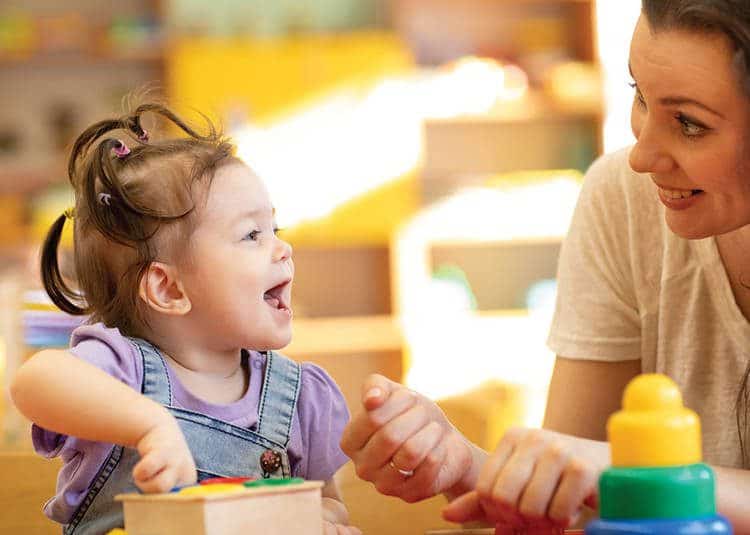
Young children’s mental health is strongly influenced by their environment and the relationships surrounding them. Photo: Oksana Kuzmina/shutterstock
Hope and Opportunity for Young Children and Their Families
Despite the significant potential consequences of the current circumstances’ negative impact young children’s mental health, there is considerable hope. The syndemic provides significant opportunities for the field of IECMH and ultimately for the health and well-being of young children, including understanding the unique mental health needs of young children and their families, appreciating the social determinants of health of the syndemic, addressing the well-being of adults and communities that care for young children, and prioritizing children’s mental health services. IECMH professionals can envision a future where this generation of young children benefits from increased attention to their mental health and from the creation of anti-racist early childhood education environments.
IECMH Consultation as a Source of Support
IECMH consultation is uniquely positioned to assist the early childhood field during this unprecedented time. There will never be enough mental health treatment services for all young children and their families who may benefit from treatment and/or clinical support. Yet, IECMH consultation can support adults who care for young children to more effectively meet young children’s mental health needs, potentially preventing mental health problems from developing or becoming worse.
IECMH consultation is an intervention that teams a mental health professional with programs and professionals that work with young children and families. This team works to promote the social–emotional development of the young children in their care. Mental health consultation is not about “fixing kids.” Nor is it therapy. IECMH consultation equips caregivers to facilitate children’s healthy social–emotional development. IECMH consultation has a long history of supporting caregivers to better understand the needs of the children in their care. By focusing on improving the functioning of caregivers many more “clients” can be helped than is possible through a direct service method (Caplan et al., 1994). Meeting consultees (staff and caregivers) in their own workplaces or environments provides the consultant critical information to understand the concerns and challenges more easily and with increased objectivity (Caplan et al., 1994).
IECMH Consultation Outcomes
Over the past decades, IECMH consultation has proven to be an effective approach for supporting young children’s mental health. Outcomes of IECMH consultation include (Center of Excellence for Infant and Early Childhood Mental Health Consultation, 2020) the following:
- children’s improved social–emotional competence and reduced challenging behavior
- teachers’ improved teacher–child relationships, decreased stress, and increased skills teaching social–emotional skills
- reduced rates of suspension and expulsion
- decreased teacher turnover
- improved staff interactions
- improved parent–child relationship
- fewer missed work days for parents
IECMH Consultation Is the Right Intervention During a Syndemic
IECMH consultation is a particularly well-suited intervention at this time due to its focus on enhancing caregivers’ capacities for supporting children’s mental health. IECMH consultants’ clinical expertise serves as a foundation for understanding what influences children’s behavior and what influences adults’ perceptions of and reactions to children’s behavior. While IECMH consultants do not provide therapy to adults or to children, their clinical expertise assists them in offering adults strategies for coping with their own anxiety and feelings of overwhelm in the midst of the syndemic. IECMH consultants create a trusting relationship with consultees so they are more likely to share their fears and concerns. Recall the consultees described at the beginning of this article, Jewel, Michelle, and Anna. All of them are looking to their mental health consultant for support, understanding, and guidance to assist them in their day-to-day work. Their fears and anxieties vary, ranging from personal to professional, yet, each of the professionals is able to access support in context of the consultative relationship. The consultant can help the consultees explore strategies to address their fears and concerns so their feelings do not inadvertently negatively impact the care they provide for children and families. Through conversations with the consultant, consultees are able to reflect on their reactions to the children’s behavior. Through reflective conversations, consultees like Jewel, Michelle, and Anna can identify the behaviors that push their buttons or get under their skin. The consultant and the consultees can also explore how various stressors may increase caregivers’ reactions or limited patience. The consultant assists the consultees to consider their reactions and assists them to instead make choices about how to respond most effectively and reduce their stress level. The conversations between the consultant and the consultee build the consultee’s reflective capacity so that even outside of the consultation conversations, the consultee can explore her own reactions and responses to children’s behaviors.
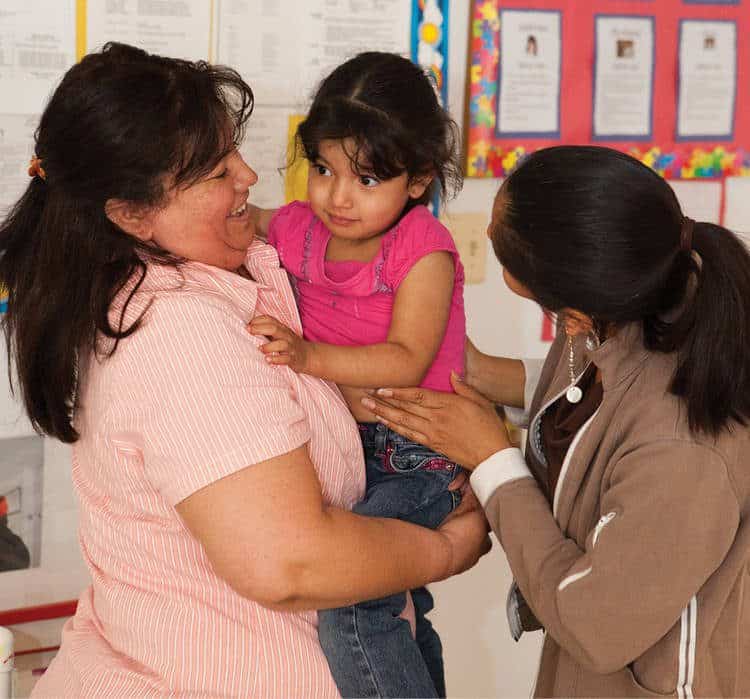
Very young children look to their caregivers to make sense of the world around them and help buffer the impact of stress. Photo: ZERO TO THREE
IECMH Consultation Can Support a Needed Focus on Staff Well-Being
The impact of staff wellness on program services has gained growing recognition over the past decade in multiple sectors from Fortune 500 businesses to family-owned early education programs (Berry et al., 2010). However, the syndemic makes focusing on staff wellness a necessity rather than a business trend. IECMH consultants are well positioned to support early childhood programs to focus on staff wellness. IECMH consultants can share stress reduction techniques with staff such as focusing on what is within their control, mindfulness, meditation, yoga, and deep breathing. Staff can implement these strategies on their own or with the children and families in their care.
IECMH consultants can offer support groups and/or “open spaces” for staff, program leaders, or families to talk about their stress and anxiety. IECMH consultants can support program directors to consider the mental wellness of their program. In other words, the consultant may pose questions to the program director and/or to staff such as “What does it feel like to work in this program?” or “Where do you turn for support when you are worried, overwhelmed, or unsure?” By supporting program directors and staff to explore these questions, IECMH consultants model reflective practice. Program directors and staff can use these same reflective questions with each other and with families. For example, a director might ask a teacher “How are you feeling? What can we do as a program to support you to be able to feel as comfortable as possible during this challenging time?” Or a home visitor might ask a parent, “How are you doing? Is there anything we can do to help support you during this unprecedented time?” This parallel process creates a culture of care, reflection, and wellness in programs. This focus on staff well-being and attention to reflection permeates the interactions within the program, ultimately positively impacting the quality of the services to children and families. When staff feel cared for and valued they can bring their best selves to their work with children and families.
IECMH Consultation Can Help Foster Anti-Racist and Anti-Biased Early Childhood Services
IECMH consultants have a profound opportunity to support the programs they work with to address issues related to equity, disparity, and racism. IECMH consultants work with programs that serve very young children and their families. These programs are in a prime position to provide services that are anti-racist and that create an environment where every child and family feels valued, welcomed, and supported early in their lives. Young children who feel nurtured and feel a sense of belonging have a strong foundation to impact the world around them for years to come.
IECMH consultants understand the profound influence beliefs, values, attitudes, biases, and experiences have on relationships, behaviors, settings, and communities in important and meaningful ways. IECMH consultant competencies (Center of Excellence for Infant and Early Childhood Mental Health Consultation, n.d.) provide an in depth up-to-date compendium of the knowledge, attributes, and skills needed to become a competent IECMH consultant. The competencies specifically describe knowledge and skills consultants need to address systemic racism and inequitable opportunity. A sample of these competencies include (a) a consultant’s ability to explore one’s own values, beliefs, backgrounds, privilege, biases, assumptions, and experiences; (b) the ability to demonstrate the capacity for self-awareness as it relates to bias, privilege, deficit-based perspectives of families and infants and young children, and other cultural issues (i.e., the ability to recognize how culturally influenced experiences shape personal and professional behavior and attitudes, including those connected to how interactions with others unfold and are perceived). When consultants understand their own biases they are best able to support consultees in understanding their own biases.
Consultants can use their expertise in understanding the influences on behavior and thinking to disrupt biases and inequities within program policies and practices. For example, a consultant may help a program explore their discipline policies, practices, and data to ensure that the program does not inadvertently discriminate against particular populations (e.g., boys and/or, in particular, Black boys). The consultant can help programs explore how they perceive young children’s behavior. The consultant can share information about implicit bias, support staff and program leaders to examine their own implicit biases, and help normalize conversations that explore bias. The consultant may ask “Where do implicit biases show up in your work with children and families?” This question may help staff to understand that everyone has implicit biases that influence interactions and behavior. The consultant can also help program leaders and staff explore the impact of oppression on the lives of children and families. For example, when the consultant is asked to help staff explore the meaning of a child’s behavior, the consultant may explore with the consultee “how might oppression impact this child or this family?” Although IECMH consultation was not intentionally designed to target implicit bias or racism, IECMH consultation strategies such as asking reflective questions, raising issue of race and gender, considering contextual influences, and reducing the influence of implicit bias in understanding children’s behavior described above are well aligned with implicit bias interventions (Davis et al., 2020).
IECMH Consultation Can Support Enhanced Family Engagement
Whether early childhood services are virtual or in person during the syndemic, it is clear that procedures are likely in place to limit in-person family interactions. At the very time when many families may benefit from an external support system to bolster their family’s well-being, likely, these interactions are significantly curtailed due to COVID-19 recommendations for physically distancing. IECMH consultants can support programs to explore ways to enhance their family engagement even if health policies require limiting in-person interactions with family members. Consultants can help programs to consider ways to include families in the decisions about new syndemic policies and procedures. Consultants can assist programs to help families prepare and support children to understand and practice new policies and practices such as new drop-off procedures or mask wearing. Consultants can help staff explore families’ and children’s perspectives. Consultants can work with program staff and leaders to explore ways to increase family engagement virtually and to perhaps share more frequently with families about their child’s development and behavior. Many consultants are offering families virtual support groups or drop-in office hours. The syndemic may be an opportunity for the consultant and staff to reflect on new approaches to meaningful and enhanced family engagement.
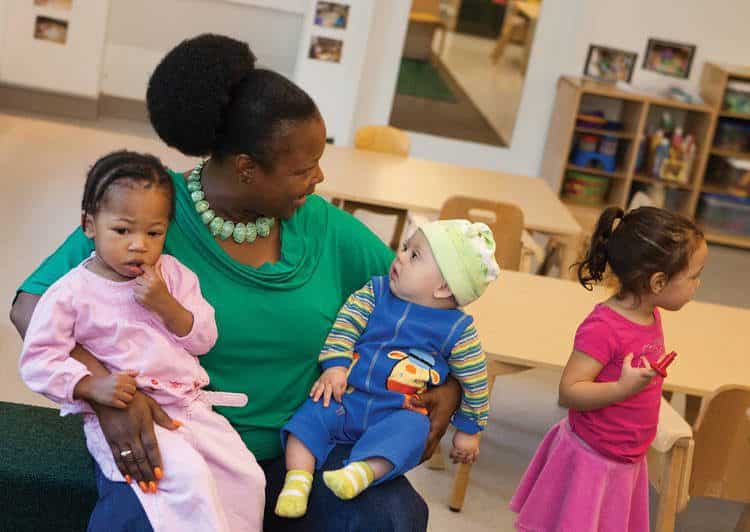
Infant and early childhood mental health consultation can support adults who care for young children to more effectively meet young children’s mental health needs. Photo: ZERO TO THREE
IECMH Consultation Is Adapting During COVID
While IECMH consultation can offer significant and much-needed support during this syndemic to address the unique mental health impacts of COVID, racism, and other inequities, the delivery of consultation may need to be and has been adapted in a number of ways. Many early childhood education services are being provided virtually, and consultants may be invited to join the virtual “classroom” to observe. In this case, consultants may observe the virtual interactions. When the consultant and teacher talk at a later time they may explore questions about the virtual interactions such as “How can I creatively engage young children and their families virtually?”; “What might I do to help this dad let his child participate on his own terms?”; “I am worried I have not been able to engage this particular family. I wonder how I can reach them?”; “How do we help this family obtain Internet access?”
Some early childhood services are having children attend in person, yet, the program may be limiting people who interact with others so the consultation is being provided virtually. In this case, the consultant may conduct observations of the classroom through a live stream service (with parents and staff’s permission). Or, aspects of the teacher and child interactions may be recorded (again with families’ and staff’s full permission) and may be shared with the consultant to review and discuss together with the staff. In these instances, consultants and staff may schedule a virtual conversation and together may identify and explore topics for discussion such as “What would you like to explore about this interaction or this time during the day?”; “What are you most pleased about in this interaction or in this part of the day?”; “What, if anything, are you most concerned about in this interaction or this part of the class?”
Finally, the consultant may not conduct virtual observations and, instead, the consultant may schedule a virtual meeting or a phone call with the staff. In this case, the consultant relies solely on the staff’s observations, perceptions, and/ or concerns. The consultant may ask similar open-ended questions about how they can be helpful. The consultant may explore staff’s thoughts about what is going well and what might be improved to support young children’s social–emotional development.
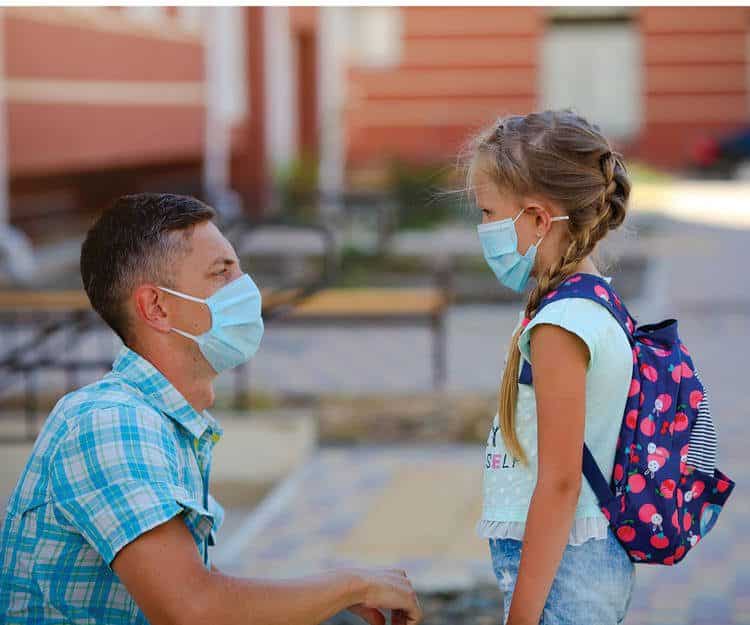
Consultants can help programs to consider ways to include families in the decisions about new syndemic policies and procedures. Photo: smile23/shutterstock
Much Is Still Unknown
While IECMH consultation is a much-needed service to support the adults supporting young children’s mental health during these unprecedented times, there is still a great deal to understand about the most effective ways to provide IECMH consultation. It has pivoted to meet the needs of programs and services to young children and their families, so research is needed to explore the impact of the pivots on the services to programs, young children, and their families. Further research is needed to explore the effectiveness of virtual consultation and the various types of virtual consultation. It will be important to understand if observations, virtual or in person, are an essential component of consultation or if the perspective of a consultee is sufficient for effective consultation. Additional research is needed to explore the implications of dosage, frequency, duration, and focus of consultation. In other words, questions remain such as:
- How often should the consultant “visit,” “observe,” or speak with the consultees when the consultant does visit (virtually or in person)?
- How long should the consultants stay (is an hour sufficient in a week)?
- How long should the consultant work with the program (i.e., 6 weeks, 1 year, 2 years)?
- How does virtual consultation impact the dose, frequency, and duration?
- How does a more intentional focus on staff wellness and family engagement impact the outcomes of consultation?
In addition, researchers are just beginning to understand the role of consultation as a disruptor of bias. As they learn more about how best to support anti-racism efforts, the research on IECMH consultation will need to keep pace. The syndemic has increased attention on supporting staff wellness, and solid research data is needed to access funding of such efforts. Lastly, increased research is needed to explore the impact of adapting to the syndemic on consultants themselves. IECMH consultants have needed to adapt the way they work in a variety of ways. While IECMH consultants have a background in mental health, they are by no means immune to physical risks and the mental stress of constant unpredictability and problem-solving during this unprecedented time.
Author Bios
Amy Hunter, MSW, is a licensed independent clinical social worker (LICSW) who earned her master’s in social work at Boston University. Ms. Hunter has a post graduate certificate from the University of Maryland School of Medicine in early childhood mental health. She currently serves as an assistant professor at Georgetown University. In her capacity at Georgetown she co-directs the mental health section of the Head Start National Center on Health, Behavioral Health and Safety, a training and technical assistance center for Early Head Start and Head Start. Ms. Hunter is also faculty on the National Center for Pyramid Model Innovations. She has worked in the field of early childhood mental health for more than 30 years. She has provided training and technical assistance on early childhood mental health to a variety of audiences around the country and has maintained a private practice in Washington, DC, providing consultation to parents with young children. Ms. Hunter lives with her husband and two boys ages 16 and 14 on Capitol Hill.
Neal Horen, PhD, is director of the Early Childhood Division at Georgetown University Center for Child and Human Development. Dr. Horen has worked closely with numerous states, tribes, territories, and communities in supporting their development of systems of care for young children and their families. He is the co-director and co-principal investigator of the Head Start National Center on Health, Behavioral Health and Safety, the Director of the Center of Excellence on Infant/ Early Childhood Mental Health Consultation and co-director of the National Training and Technical Assistance Center for Children’s Mental Health. He is the Georgetown Lead for the Technical Assistance Resource Center, the Maternal Infant Early Childhood Home Visiting Technical Assistance Center, and the Georgetown lead for the Preschool Development Grant Birth to 5 years old Center. In addition, Dr. Horen works in Lebanon, Jordan, the United Arab Emirates, and Mexico on early childhood mental health. He continues to spend time working n direct clinical care including development of social skills interventions for young children and is director of the HOYA clinic which offers therapeutic and assessment services for young children and families. Dr. Horen’s primary interest is in early childhood mental health and he has lectured extensively on infant and early childhood mental health, challenging behaviors in young children, social skills development, and the impact of trauma on child development. He is the proud father of four children, 21, 20 and 20, and 5 years old.
Suggested Citation
Hunter, A., & Horen, N., (2021). Infant and early childhood mental health consultation in the midst of a syndemic: How does the field pivot? ZERO TO THREE Journal, 41(3), 17–23.
References
Berry, L., Morabito, A., & Baun, W. (2010). What’s the hard return on employee wellness programs? Harvard Business Review. link
Brennan, E. M., Bradley, J. R., Allen, M. D., & Perry, D. F. (2008). The evidence base for mental health consultation in early childhood settings: Research synthesis addressing staff and program outcomes. Early Education and Development, 19(6), 982–1022. https://doi.org/10.1080/10409280801975834
Caplan, G., Caplan, R., & Erchul, W. (1994). Caplanian mental health consultation: Historical background and current status. Consulting Psychology Journal: Practice and Research, 46(4), 2–12. https://psycnet.apa.org/record/1995-30593-001
Center of Excellence for Infant and Early Childhood Mental Health Consultation. (2020). Annotated bibliography: The evidence base for infant and early childhood mental health consultation (IECMHC). link
Center of Excellence for Infant and Early Childhood Mental Health Consultation. (n.d.). Consultation competencies. http://www.iecmhc.org/documents/IECMHC-competencies.pdf
Davis, A. E., Perry, D. F., & Rabinovitz, L. (2020). Expulsion prevention: Framework for the role of infant and early childhood mental health consultation in addressing implicit biases. Infant Mental Health Journal, 41(3), 327–339. https://doi.org/10.1002/imhj.21847
Fegert, J., Vitiello, B., Plener, P., & Clemens, V. (2020). Challenges and burden of the Coronavirus 2019 (COVID-19) pandemic for child and adolescent mental health: A narrative review to highlight clinical and research needs in the acute phase and the long return to normality. Child and Adolescent Psychiatry and Mental Health, 14, 20. https://doi.org/10.1186/s13034-020-00329-3
Golberstein, E., Gonzales, G., & Meara, E. (2019). How do economic downturns affect the mental health of children? Evidence from the National Health Interview Survey. Health Economics, 28, 955–970. https://doi.org/10.1002/hec.3885
Hepburn, K. S., Perry, D. F., Shivers, E. M., & Gilliam, W. S. (2013). Early childhood mental health consultation as an evidence-based practice: Where does it stand? ZERO TO THREE.
Horton, (2020). Offline: COVID-19 is not a pandemic. The Lancet, 396, 874. link
Marcelo, A. K., & Yates, T. M. (2019). Young children’s ethnic–racial identity moderates the impact of early discrimination experiences on child behavior problems. Cultural Diversity and Ethnic Minority Psychology, 25(2), 253–265. http://dx.doi.org/10.1037/cdp0000220
National Scientific Council on the Developing Child. (2008/2012). Establishing a level foundation for life: Mental health begins in early childhood: Working paper 6 (Updated ed.). link
Perry, D. F., Dallas Allen, M., Brennan, E. M., & Bradley, J. R. (2010). The evidence base for mental health consultation in early childhood settings: A research synthesis addressing children’s behavioral outcomes. Early Education and Development, 21(6), 795–824




